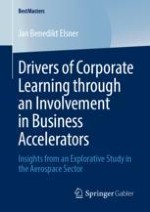2020 | Buch
Über dieses Buch
Jan B. Elsner deduces critical factors that impact corporate involvement in business accelerators as a strategy to adapt internal innovation processes. Based on insights from the aerospace industry he develops a new model for corporate learning that enables accelerator programs to better promote the development of innovations at corporate level. Driven by the need to rejuvenate corporate culture, there is an increasing interest of established corporations in collaboration models with startups. This book extends previous research on business accelerators and corporate entrepreneurship and offers valuable results for the strategic assessment of accelerators to keep up with future business challenges.
Anzeige
